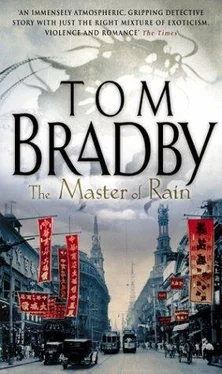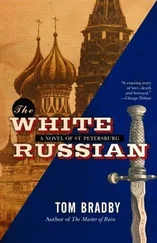Both ground-floor flats had tiny yards beside them, behind a wrought-iron fence, next to the road. In both, lines of laundry swayed in the breeze. Natalya had lived in 1A, and the woman who lived there now also looked like a prostitute-heavily made-up, with high leather boots and a tight top. She must have been fifty, and looking at her made Field feel queasy. The door was slammed in their face.
“Silent again today, polar bear,” Caprisi said as they turned away.
Field didn’t answer.
“But I’m glad you called.”
Field still didn’t respond. He wasn’t certain whether he had been right to give Caprisi Natalya Simonov’s address. He hadn’t told him that she and Natasha had been sisters.
“You’ve done well, polar bear.”
In the flat opposite, they found an elderly couple named Schmidt who, shaking their heads sadly, said they had known Natalya and invited them in.
The sitting room was even smaller than Field had expected, and nothing about it suggested any connection at all with Shanghai. Neither of them was allowed to refuse Mrs. Schmidt’s offer of chocolate torte and coffee, and as they listened to her-she was a talker, he could see, too often devoid of company-Field studied her husband and the photograph of a young boy in uniform on the sideboard.
“Our son,” Mr. Schmidt said proudly.
“Otto,” his wife said, handing each of them a plate with a large slice of cake. “He is the butcher now.”
They both spoke with broad German accents, and Mrs. Schmidt had said this without a hint of irony.
“Your son is a butcher?” Caprisi asked.
“It was Hans’s business when we married and we build it up. Now we give it to our son.”
“He fought in the war?” Field asked.
She looked at him, trying to gauge if there was any hostility in his eyes. “He wished to. For his country.”
“We understood,” Hans said in a manner that indicated they had not.
Hans was a small man, with a face permanently set in a smile, a long nose and forehead, and an almost oval skull, with a few hairs straying in different directions across its crown. His wife was plump, neat, and ordered, her dress pressed, her hands placed carefully in her lap.
They were poor but honest, Field thought.
“Natalya,” Caprisi said.
“You were friends?” Mrs. Schmidt asked him.
“In a manner of speaking.”
She leaned forward. “Do not worry. You are police, I can tell, but we will not…” She looked at her husband conspiratorially, then back again. “The French police…”
“Yes.” Caprisi cleared his throat. “You knew her?”
“Of course! We are neighbors. I know it is the way of some in the big city to… But we are from a small town in Bavaria. It is not our tradition.” She looked at her husband again. “We have lived here so many years.”
“So you knew her well?”
“We would look after her cat sometimes. And her little boy, of course.” She shook her head sorrowfully.
“Her little boy?” Caprisi said.
“Yes. Alexei.”
“How old was he?”
“Her little boy?” Field asked, finally taking in what she’d said.
“Alexei, yes. He is six.”
“She had a son?” Field said.
“Yes.”
“Natalya Simonov had a son?” he repeated.
“Yes.”
“It was her own?”
“Ja. Of course.”
“Natalya Simonov had a boy?” he said once again. They were all frowning at him now. “What has become of him?” he added quickly.
The Schmidts looked at him, as if he were stupid. “The orphanage, of course.” Mrs. Schmidt turned to her husband. “What could we do? We could not have him. Could we, Hans?”
“No.” He shook his head firmly.
“Where else could he go?” she said.
Field felt a sense of despair creeping over him. “The boy, Alexei, went to an orphanage?”
“Ja.”
“What about his family?”
The Schmidts looked at each other, shaking their heads.
“Natalya had no family?” Field said. “No one who came to see her, no one the boy could have gone to?”
They shook their heads again.
“Which orphanage?”
Mrs. Schmidt exchanged glances with her husband. “They came in a car… there was a nun. I do not know her name. In Shanghai they are all the same.”
“Did he want to come here?” Caprisi asked.
“How could we?”
“We are old,” Hans said. “We are old!”
“It was Otto. He should never have had… She was no good for him. Afterwards he could not bear to see the boy.”
“The boy… Alexei was his?”
“No!” She shook her head vigorously. “Of course not. My Otto is not like this. He is an honorable man, but the boy reminded him of his love for her and the family they could have had. He could not shake her from his silly head, even before she died.” Mrs. Schmidt looked at her husband, then back at Caprisi. “She was pleasant to us, always friendly. I must say that. But she was-”
“I know.”
“How could our boy be interested in a woman like that?”
“Of course.”
“It was a foolish thing. He had forgotten her, but then…”
“Yes.” Caprisi nodded.
She sighed heavily.
“Did Natalya ever… entertain… people at home?” Caprisi asked.
“Sometimes. Not often, because of the boy. She would go to… it is not work. Prostitution is not work.”
“No.” Caprisi cleared his throat. “But men would sometimes come here?”
“Sometimes.”
“During the day? At night?”
“When the boy was at school. Sometimes at night.”
“Was there anyone in particular the last few months before her death?”
Mrs. Schmidt turned to her husband again, seeking his approval. He nodded. “The last month-no, more, two months-there was a change.”
“In her, or the pattern of her behavior?”
“In both. In the day there were no more visitors, but at night I think one man came.”
“You think?”
“She would let him in the side gate, to the yard.”
“Did you see him?”
She shook her head. “From here, we could not see.”
“Never heard his voice?”
“It is too far away.” She clicked her tongue to indicate her frustration.
“And did she talk about him?”
“Yes,” she said, punching the air with her forefinger. “Yes. She was happy, she said, things would get better. She had met a man, a rich man, powerful, and she would be able to get away with Alexei, start again, somewhere new… Europe. She asked us where she should go if she were to visit Germany, and what kind of country it was, and if we had ever been to France and England.” She looked at them, suddenly suspicious. “Otto was upset, but it was not serious. He would have got over it, and I said, Liebchen, she is… you know. Leave her to her powerful man.”
“So you never saw this man?”
“No.”
“And you never heard his voice or found out his name?”
“Nein, nein.”
“Was he Chinese?”
Mrs. Schmidt shrugged extravagantly. “How could I know? It is possible, likely, given her… type. It would be like her type to go with a Chinese.” She wrinkled her nose in disgust.
“So you have no idea who he was?”
“Rich. Powerful. So she said. Good. He makes her happy. Good. Ja. She finds a man willing to consort with her… type. He gives the boy presents, so-”
“What kind of presents?” Field asked.
She shrugged again. “A model airplane. Wooden. Nothing special.”
As her good-neighbor act fell away, Field was beginning to find this woman vexatious in the extreme.
“Otto has given her a silk scarf, but she does not like it. She does not like it! She asks him if she can take it back to the shop!”
Читать дальше












